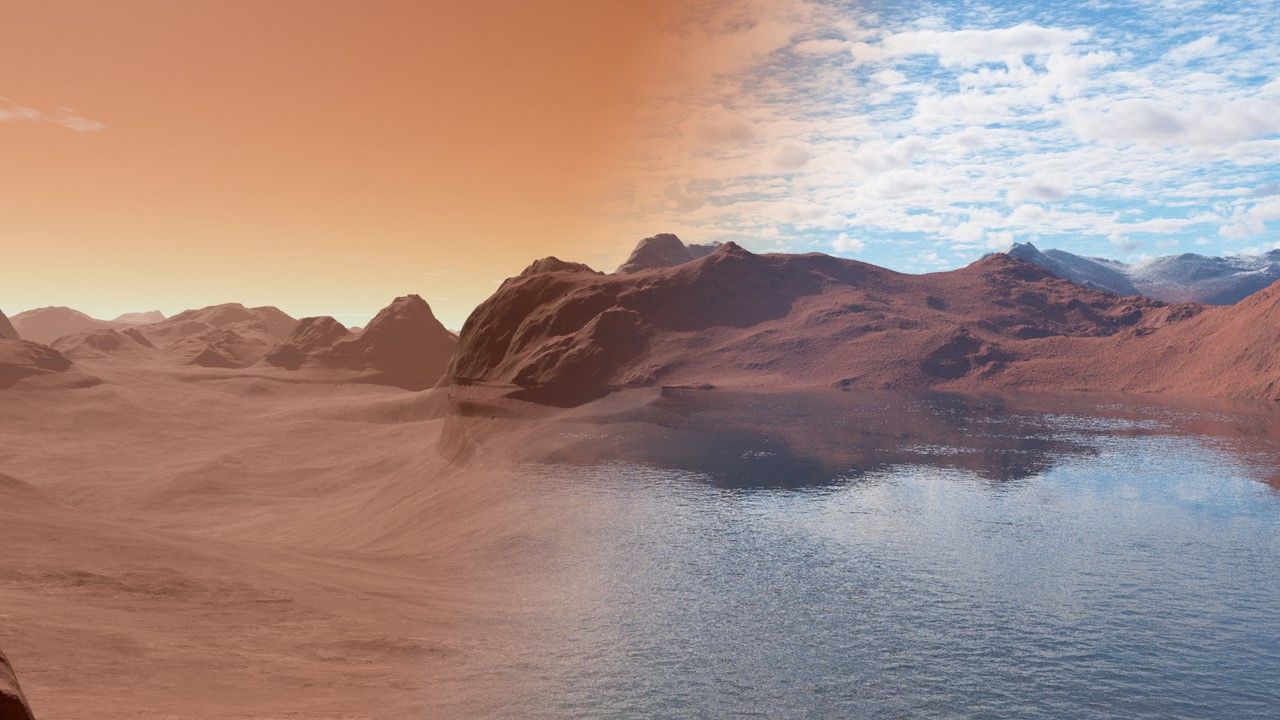
Mars may be a barren, frozen world now, but a series of clues has indicated that it was once a much warmer—and wetter—planet. But where did all that water go? New research proposes that basaltic crusts formed by lava may have sucked up all that water like a giant, dry sponge.
Past theories have proposed that most of Mars' ancient water was swept out to space by gusting solar winds or as a result of a collapse of the planet's magnetic field. Others have suggested much of the missing H2O may be contained in ice tucked under the surface of the planet.
But scientists at Oxford's Department of Earth Sciences suspected that the answer to the missing water mystery could be connected to Mars' early geology. They published their theory in a study appearing today in the journal Nature.
"People have thought about this question for a long time, but never tested the theory of the water being absorbed as a result of simple rock reactions," Jon Wade, from the Department of Earth Sciences at the University of Oxford, said in a statement. "There are pockets of evidence that together, leads us to believe that a different reaction is needed to oxidize the Martian mantle. "
The key to the reaction in question is iron, Wade and his colleagues explain. In the same way your bicycle will start to rust if left outside in damp weather for extended periods, higher levels of iron detected in the silicate of Mars' mantle suggest its surface was once likely to react with water and form a variety of water-containing minerals.
Wade and his team used modeling methods to assess the composition of rocks on our own planet to determine how much water could have been absorbed in reactions with similar rocks on Mars. Basing models on data collected by Martian rovers, they calculated details of Mars' early geology, including the temperatures, composition and pressures within its mantle. All those factors indicated that the basalt rocks on Mars could have sucked in 25 percent more water than the same rocks on Earth. This points to the possibility that water on the surface of ancient Mars was prone to geological chemistry that would have relocated its elements into minerals inside the planet's mantle.
But why would this have happened on Mars and not on Earth? Mars' atmosphere is thinner and the planet is much smaller, just slightly more than half the size of Earth. Both factors make it more difficult to retain water on its surface, the authors say. The increasing temperatures within the core of our own planet could also have played a role in blocking water from reacting with minerals in our mantle, Gizmodo reported.
"Mars is much smaller than Earth, with a different temperature profile and higher iron content of its silicate mantle," Wade said in a statement. "These are only subtle distinctions but they cause significant effects that, over time, add up. They made the surface of Mars more prone to reaction with surface water and able to form minerals that contain water."
As interesting as this new theory is, it likely can't explain the entire mystery of the missing Mars water. In an accompanying commentary in Nature, Tomohiro Usui, from the Earth-Life Science Institute at the Tokyo Institute of Technology in Japan, suggests that some of the Red Planet's water was likely lost to space due to its weak gravity (a 150-pound person would weigh a mere 57 pounds on the Red Planet, according to Live Science).
And then there is the question of ice. Researchers using NASA's Mars Reconnaissance Orbiter have calculated that a subterranean region on Mars could hold about as much water as contained in Lake Superior. Now we just need to get there ourselves to start drilling and find out which theories hold the most water.
Uncommon Knowledge
Newsweek is committed to challenging conventional wisdom and finding connections in the search for common ground.
Newsweek is committed to challenging conventional wisdom and finding connections in the search for common ground.
About the writer
To read how Newsweek uses AI as a newsroom tool, Click here.








